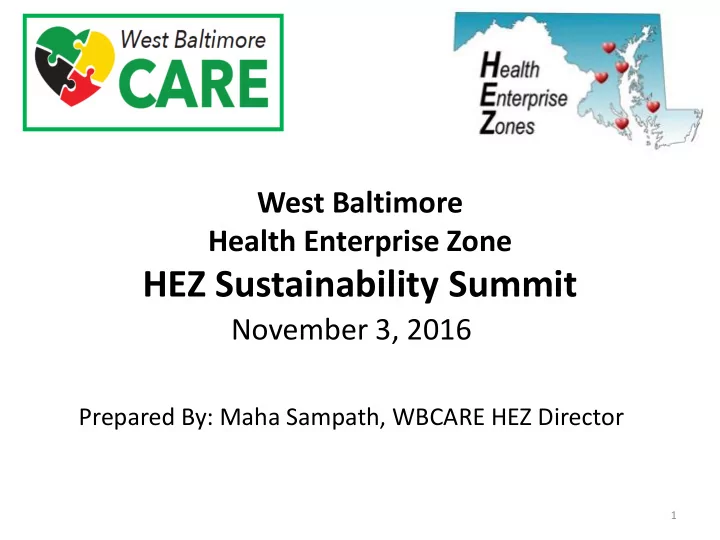

West Baltimore Health Enterprise Zone HEZ Sustainability Summit November 3, 2016 Prepared By: Maha Sampath, WBCARE HEZ Director 1
Our Call to Action
West Baltimore Community Profile • Approximately 86,000 Residents • African-Americans comprise more than 76% • Average median income in this area is $27,158 • Highest disease burden and worst indicators of social determinates of health than any other community in Maryland 3
West Baltimore Patient Profile • Often unemployed or “working poor” • Living in and out of crisis • Frequently on the edge of homelessness • Three times more likely to have cardiovascular disease than in any other area in the state of Maryland 4
Our Partners Community-Based Organizations FQHCs Equity Matters Baltimore Medical System Park West Health System, Inc. Light Health and Wellness Comprehensive Services, Inc. Total Health Care, Inc. Mosaic Community Services Hospitals Bon Secours Baltimore Health Academic Institutions System University of Maryland University of Maryland - Midtown Coppin State University St. Agnes Hospital Baltimore City Community College Sinai Hospital of Baltimore University of Maryland Medical City and State Center Senator Verna Jones-Rodwell Baltimore City Health Department 5
Our Goals and Strategies for Building a Healthy Community
West Baltimore Health Enterprise Zone (HEZ) Focus Geographic and Target Population: 86,000 West Baltimore residents within the 21216, 21217, 21223, and 21229 zip codes 1,200 High Utilizers Core Disease and Target Conditions: Cardiovascular Disease (CVD) CVD Risk Factors (i.e., Diabetes and Hypertension) Overarching Strategies: Care Coordination (Hospital High-Utilizers) Community-Based Risk Factor Reduction 7
HEZ Management Structure West Baltimore Provides executive Primary Care Access leadership and strategic support Collaborative / Steering Committee The Coordinating Bon Secours organization providing Baltimore Health program management and System fiduciary oversight HEZ Program State HEZ Team HEZ Advisory Board Management Team Ensures programs and Responsible for Provides technical services are responsive to program planning, day- assistance to all HEZ the health and social to-day management services needs and and oversight desires of West Baltimore residents 8
Care Coordination Program Component Description Target Population High Utilizers Referral Source HEZ Hospitals (5) Staffing Model Includes Program Coordinator, Scheduler, Nurse Care Coordinator, Community Health Workers/Health Coaches Program Elements Two-Tier System • 30 Day Intervention – All High Utilizers • 60 Day Intervention – Subset of High Utilizers requiring additional support post 30 day intervention Tools and Technology Three complimentary technology systems: CARMA, Care at Hand and CRISP Evaluation 6 Months Pre-Intervention and 6 Months Post-Intervention using CRISP Reporting 9
Care Coordination Model Enrollment in Create & Provide Care Hospital Completion Execute Support Referral Coordination of Program Care Plan 30 – 60 days Program Weekly and Monthly Reporting - # of Referrals, Program Completion, Readmissions 10
Community-Based Risk Factor Reduction Community Increased Outreach and Recruitment of Identification Health Primary Care and Screening Awareness Professionals of Residents Education Community Physical Health Careers Partnership Activity Scholarships Grants 11
Key Impacts and Outcomes
Key Impacts • Successfully connected 7,200+ high utilizers to a Community Health Worker (CHW) • Our CHWs completed 7,400+ encounters with high utilizers via home visits, phone, health screenings and clinic visits • Successfully connected high utilizers to a Primary Care Provider • Provided State tax credits and loan repayments in the amount of $116K to 17 retain HEZ providers • Awarded 16 community – based organizations with a total of $130K in to support community CVD programs serving 2500+ residents • Awarded 85 scholarships totaling more than $250K to HEZ residents to pursue health careers • Offered free fitness classes for the community in partnership with neighborhood Recreation Centers and Churches – From 2015-2016, avg. wt. decrease ~15lbs, avg. BMI decreased ~1.5 • Provided 25 CHW and 1 trauma informed care training(s) and planning in progress for a cultural competency training 13
Outcome – Readmission Rate Reduction ★ 14
Outcome – Improved Quality of Care West Baltimore ★ ★ 15
Outcome – Care Coordination Program Specific • Working with the Chesapeake Regional Information System for Our Patients (CRISP) to analyze and compare hospital ER visits and charges pre and post for patients who completed the HEZ Care Coordination program • Initial Pre/Post Analysis Report provided specific to one participating hospital only; Preliminary results show some improvements in charges/visits for residents who received HEZ Care Coordination services • Working with CRISP to refine the report and include data for other participating hospital partners 16
Lessons Learned and Moving to Sustainability
Lessons Learned • Partners/Model Complexity – Clear roles and responsibilities – Ongoing engagement and dialogue – Competing priorities and multiple care coordination efforts • Patient Population Challenges (trust, transient, basic resources) – Ongoing communication and dialogue – Flexibility and agility with shift of focus/scope • Sustainability – Plan for sustainability early on and have funding sources lined up • Access to Impact and Outcome Data – Identify and confirm sources of program data and access upfront 18
Moving to Sustainability • Working with Partners to Develop and Execute a Sustainability Plan – Reviewed progress against program goals (Completed) – Identified critical activities and/or features that facilitated success – Care Coordination and Scholarship Programs (Completed) – Identifying partners to support and promote selected programs (In Progress) Assessed ongoing engagement of current partners given competing priorities Explored filing for a 501(c)3 Identifying new partners – Building a Business Case for Sustainability (In Progress) Programs identified for sustainment align with recently completed Bon Secours Community Health Needs Assessment Finalizing CRISP reporting – Seeking funding sources (In Progress) Through a grant from the Kaiser Foundation, Scholarship Program recipients are connected with Bon Secours Community Works to assist with job readiness and placement 19
Patient Story
Recommend
More recommend